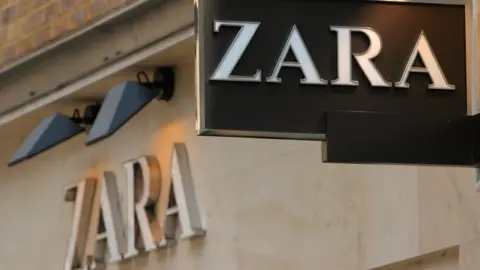House of Zana owner hopes Zara trademark win will inspire others
 Women in Collaboration
Women in CollaborationAmber Kotrri, a boutique owner and designer from Darlington, made headlines last month by winning a trademark dispute with global fashion company Zara. Now she hopes other small businesses will be inspired to fight back against conglomerates. The BBC has spoken to her and other entrepreneurs about their experiences.
Mrs Kotrri represented herself, rather than using lawyers, when she faced the trademark tribunal.
Armed only with her file of notes and a firm belief she was right, the owner of boutique House of Zana took on Zara and won, with the trademark registrar agreeing any similarity between her fashion brand and the high street chain was "too insubstantial and fleeting".
Since then, she has been inundated with messages from other small business owners who have also received letters from Zara's lawyers.
"The letter says the company's 'strong preference is to resolve this matter amicably' but there is no middle ground, there's no chance to discuss anything," she says.
"You're only given a couple of weeks to sign saying you'll withdraw the trademark application and then a further three months to 'phase out' your brand name, that's the only option."
Rebranding a business is not cheap - changing packaging, merchandise, websites and social media all adds up.
Juhi Jain, from Jaipur, India, named her handmade shoe company Zarsá - an amalgamation of the Urdu word Zar and Hindi affix "sa" - which she said meant "like gold", in reference to the thread she uses in her stitching.
She spent "about £30,000" and two years locked in a legal battle after Zara initially sent a notice of opposition in 2017, and then again when it was renamed Zarsalife. She eventually settled on the name Sozan Jaipur.
 Juhi Jain
Juhi Jain"There is no price I can put on the mental and emotional trauma and depression I went through during this process," said Ms Jain.
"I never got any compensation for the legal fee or merchandise that I had to discard."
Trademarks are extremely important to businesses, they can be bought and sold like other assets, or licensed to third parties, which can make them important revenue generators.
In the UK big brands employ teams to monitor the use of the similar names through the Intellectual Property Office and Companies House.
Mark Caddle, a partner at European intellectual property firm Withers & Rogers, said trademarks stopped the unauthorised use of copycat brands or competing brands, both of which could confuse consumers.
 Tim Ireland/PA Wire
Tim Ireland/PA WireHe warned any small businesses ignoring these rebrand demand letters from Zara that further legal action could follow.
"If the letter gets no response, a trademark opposition is likely to be made to the UK Intellectual Property Office, as happened in the House of Zana case," he said.
"Depending on how this goes, the brand owner may decide to bring a trademark infringement action in court, with the aim of enforcing a rebrand."
Zara is owned by Inditex, one of the world's largest fashion distribution groups with more than 6,400 stores of different brands, including Bershka, Pull & Bear and Massimo Dutti. It employs more than 160,000 people.
An Inditex spokesman said: "It is the group's responsibility to protect its brands and trademarks where there is any risk of customers, or any other stakeholders, becoming confused.
"We always seek to avoid proceedings around trademark registration wherever possible."
 Ste Rex
Ste RexLeeds graffiti artist Steve Powell - or Ste Rex - sold streetwear under the brand name STRX.
Then he received a legal letter last July from clothing brand Stradivarius, also owned by Inditex, saying it was too similar to its STR Teen line.
"I hadn't heard of Stradivarius," Mr Powell said. "I thought it was a violin company, and I thought, 'how dare they contact me about name similarity?'."
He said he did not want to "waste any money" so "sent a few emails" before changing the name of his clothing line to REXNTRIC.
Another business owner contacted by Zara was Moien Tayari, from London, who ran a nut and spice company called Zaravand, named after his wife's birthplace in Iran.
 Moien Tayari
Moien TayariMr Tayari said he had been advised by business experts "to forget about fighting a big company" as it would cost too much.
He spent about £4,000 on a "few legal letters" trying to preserve the name but with costs spiralling he opted in the end to rename his business Zoetic Ltd.
He said it did not feel right large companies could "bully small businesses" because of small differences in a trademark and stressed he had found the process emotional and exhausting.
"It tires you out," Mr Tayari said.
"It's another obstacle to what you've already achieved. For us it meant throwing away labels which I'd just ordered at a cost of £600.
"It was almost like having to restart the business."
Allow Instagram content?
The Federation of Small Businesses (FSB) has been calling for a government-backed resolution service for cases like these.
An FSB spokesperson said small firms needed more support when it came to protecting intellectual property and - where a dispute arose - the settlement should be "simple, swift and easy to obtain".
It said a business dispute resolution service could "triage prospective disputes at an early stage", potentially avoiding expensive legal fights.
The Intellectual Property Office (IPO), which has jurisdiction for the registration of trademarks, said it was aware of the issues for small businesses and welcomed suggestions that would make disputes "easier and quicker".
A spokesperson said: "The IPO already has a range of targeted measures to support smaller businesses who find themselves in a trademark registration dispute.
"Our mediation service, and low-cost appeals route, are designed to provide affordable and accessible routes to help to resolve such disputes outside of the courts."
However, not all trademark disputes cause distress and disappointment.
In May, the landlord of the Star Inn pub in the village of Vogue, Cornwall, had a surprise when he received a letter from Vogue the fashion magazine, which said it had been alerted to the pub's name through Companies House.
The publisher, Condé Nast, later apologised and gave the pub a framed version of the apology "from one Vogue to another", pointing out that further research by its team would have shown "we did not need to send such a letter on this occasion".
 Tracy Kidd
Tracy KiddFor Mrs Kotrri, her fight against Zara was born out of a determination not to have to explain to her children she gave in because "someone bigger told me to".
She advised others who find themselves in the same situation: "You know your business best, you know the meaning behind the name, so fight for it and don't give up."
Her House of Zana trademark will now be registered.
Zara did not want to comment on the judgement in Mrs Kotrri's case but said it would "continue to wish" her and her business "success in the future".
Zara could still appeal against the decision, but for now Mrs Kotrri is planning her next collection in peace.

Follow BBC North East & Cumbria on Twitter, Facebook and Instagram. Send your story ideas to northeastandcumbria@bbc.co.uk.
